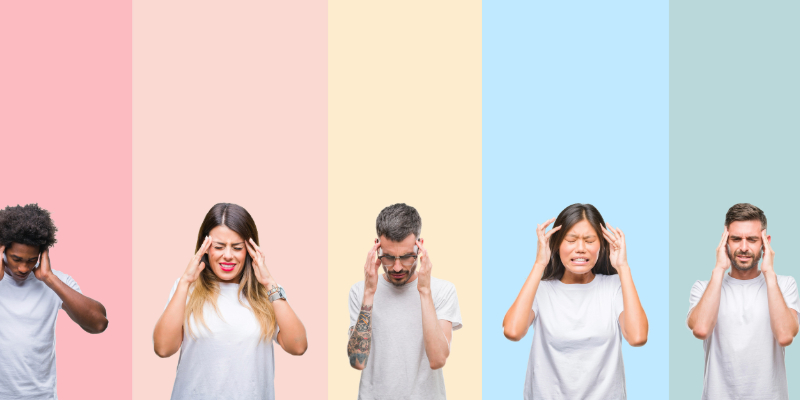Headaches can be unpleasant and affect our daily activities. In addition to traditional methods, there are many unusual ways that can bring relief. Here are some of them::
Can botox be effective in treating migraines?
Yes, botox can be effective in treating migraines. Botulinum toxin type ABotox, also known as botox, is approved by the FDA for the treatment of chronic migraines. How does it work?
How does Botox relieve migraines?
Botox works by blocking pain signals in the nerves. It is injected into certain muscles of the head and neck, which causes them to relax. Blocking pain signals this can prevent the occurrence of migraines or reduce their intensity and frequency.
How is botox treatment going?
- Doctor's consultation: A specialist doctor will evaluate whether Botox is appropriate for treating your type of migraine.
- A series of injections: Botox is given as a series of small injections in the head and neck area. This usually involves about 31 injections.
- Frequency of treatment: Injections are given every 12 weeks to maintain the therapeutic effect.
What are the benefits of botox treatment?
- Reducing the frequency of migraines: Many patients report a significant reduction in the number of days with migraines.
- Relief of symptomsBotox can also help reduce the severity of other migraine symptoms, such as nausea and photosensitivity.
- Improving the quality of life: Reducing the frequency and severity of migraines can lead to improvements in the overall quality of life and ability to perform daily activities.
What are the possible side effects?
As with any medical procedure, botox treatment can be associated with some side effects. They can be:
- Pain at the injection site: Temporary pain or discomfort at the injection site.
- Flu symptoms: Some patients may experience flu-like symptoms.
- Muscle weakness: In rare cases, there may be temporary muscle weakness around the injections.
The importance of professionalism
Botox treatment should only be performed by a qualified medical professional. A professional ensures that the procedure is performed safely and efficiently, minimizing the risk of complications. Pre-procedure consultations they are necessary to adapt treatment to the individual needs of the patient and ensure that there are no contraindications to the use of botox.
Thank you for your information about botox rooms Chloe Clinic in Warsaw
Do you have any experience in treating migraines with botox? Share your experience in the comments!
Can eating spicy food help?
Yes, eating spicy foods can help relieve headaches. Capsaicin, a substance found in hot peppers has analgesic properties. How does it work?
How does capsaicin relieve headaches?
Capsaicin stimulates pain receptors in the mouth, which distracts the brain's attention and reduces the sensation of headaches. It works on the principle of reducing the sensitivity of nerves to pain by reducing the level of substance P, a neurotransmitter responsible for transmitting pain signals to the brain, for a long time.
What spicy dishes are worth trying?
- Chili pepper: The best known source of capsaicin. They can be added to a variety of dishes, such as soups, sauces, or meat dishes.
- Sos sriracha: A popular chili sauce that can be used as a side dish for sandwiches, salads and hot dishes.
- Spicy curry: Indian dishes such as curries often contain spicy spices and chili peppers, which can relieve headaches.
How to eat spicy food safely?
To avoid the discomfort associated with the use of spicy food, it is worth remembering a few rules::
- Start with small amounts: If you are not used to spicy food, start with small amounts and gradually increase the amount.
- Consume with fat: Adding fat to spicy foods (such as yogurt, coconut milk) can help reduce the intensity of sharpness.
- Avoid eating on an empty stomach: Spicy food can irritate the stomach lining, so it is better to eat it as part of a larger meal.
Eating spicy foods can be an effective way to relieve headaches due to their capsaicin content. It's worth trying out a variety of spicy dishes to find the ones that best suit your occasion. However, do not forget to consume them in moderation and monitor the reaction of your body.
Do you have any favorite spicy foods that help with headaches? Share them in the comments!
Can aromatherapy be effective?
Yes, aromatherapy is one of the most unusual but effective ways to relieve a headache. The use of essential oils can bring relief due to their natural therapeutic properties. Here are a few essential oils worth trying:
Lavender Oil
Known for its relaxing propertieslavender oil is one of the most popular essential oils used in aromatherapy. Its delicate floral fragrance helps reduce stress and tension, which is often the cause of headaches. Inhaling Lavender Essential Oil this can help reduce your headache by using:
- Inhale directly from the bottle or with a diffuser.
- Add a few drops to hot water and inhale the steam.
- Apply the diluted oil to your temples and wrists.
Peppermint oil
Peppermint oil This is another effective essential oil used in aromatherapy. Known for its refreshing cooling effect, it can quickly relieve headaches. Peppermint oil contains menthol, which has analgesic and relaxing properties. Applying Peppermint oil on the temples can bring relief through:
- Gently rub the diluted oil into your temples and neck.
- Add a few drops to the diffuser to spread the fragrance around the room.
- Inhalation directly from the bottle in moments of sudden headache.
How to use aromatherapy at home?
To effectively use aromatherapy at home, you should stock up on a few basic accessories:
- The reflector - a device that distributes essential oils through the air.
- Base oils - such as coconut or almond oil, which is used to dilute essential oils before applying to the skin.
- Personal Inhaler - a small device that allows you to inhale essential oils directly.
Remember to always dilute essential oils before applying to the skin to avoid irritation. If you are pregnant, nursing, or have any medical conditions, consult your doctor before using aromatherapy.
Aromatherapy can be an effective, natural way to relieve headaches. It's worth trying out various essential oils like lavender and peppermint to find the one that works best for your occasion. With simple application methods, aromatherapy can be easily introduced into your daily life.
Do you have any favorite essential oils for headaches? Share your experience in the comments!
Are alternating warm and cold compresses effective?
Yes, using alternating warm and cold compresses can be an effective treatment for headaches. This method uses different temperature properties to relieve pain.
How to use warm compresses?
Warm compress this helps to relax tense muscles that can be the cause of headaches. Here's how to do it:
- Preparation of the compress: You can use a warm wet cloth or a heated thermal pillow.
- Placing a compress: Put a warm compress on your neck and leave it on for 15-20 minutes.
- Repetition: You can repeat this process several times a day, depending on the need.
How to use cold compresses?
Cold compress this can narrow the blood vessels and reduce pain and inflammation. Here's how to do it:
- Preparation of the compress: You can use ice wrapped in a thin towel or a special cooling pad.
- Placing a compress: Apply a cold compress to your forehead or temples and leave it on for 10-15 minutes.
- Repetition: As with a warm compress, this process can be repeated several times a day.
Can drinking coconut water help?
Yes, coconut water is a great rehydration remedy that can help relieve headaches caused by dehydration.
How does coconut water relieve headaches?
Coconut water contains electrolytes such as potassium, sodium, and magnesium, which quickly hydrate the body. Dehydration is a common cause of headaches, so regular consumption of coconut water can help you maintain adequate hydration levels and prevent headaches.
What is the best way to consume coconut water?
- On an empty stomach: Drinking coconut water in the morning on an empty stomach can help hydrate your body quickly.
- After physical activity: Coconut water is ideal for use after a workout when the body needs to replenish its electrolytes.
- During the day: Regular consumption of coconut water throughout the day helps maintain adequate hydration levels.
The use of alternating warm and cold compresses and the use of coconut water are effective natural methods of relieving headaches. Warm compresses help relax tense muscles, while cold compresses reduce inflammation. Coconut water, thanks to its moisturizing properties, can prevent headaches from dehydration.
Do you have proven methods for relieving headaches? Share them in the comments!
Can breathing techniques affect your headache?
Yes, breathing techniques can be very effective in reducing headaches. Deep, slow breathing this helps to relax and relieve tension, which is often the cause of headaches.
How does the 4-7-8 breathing technique work?
The 4-7-8 breathing technique developed by Dr. Andrew Weil is a simple but effective way to relieve stress and relieve headaches. Here's how to do it:
- Inhale through the nose for 4 seconds: Inhale slowly and deeply through your nose, counting to four.
- Hold your breath for 7 seconds: Stop breathing while counting to seven. This allows the body to better saturate with oxygen.
- Exhale through the mouth for 8 seconds: Slowly release the air through your mouth, counting to eight. This extended exhalation helps you relax.
Regular use of this technique can help reduce tension, improve sleep quality, and overall stress reduction, which can therefore reduce the frequency and intensity of headaches.
Does ginger consumption affect headaches?
Yes, ginger has natural anti-inflammatory properties and can help relieve headaches. It contains gingerol, a substance with strong anti-inflammatory and antioxidant effects.
How to use ginger for headaches?
- Ginger TeaMake ginger tea by adding fresh ginger slices to hot water. Drink it several times a day to ease your headache.
- Side dish for dishes: Add fresh or dried ginger to dishes such as soups, sauces, and meat dishes.
- Supplements: You can also take ginger in capsule or tablet form, which is available in pharmacies and health food stores.
Ginger can also help ease the nausea that often accompanies migraines. Regular consumption of ginger can improve the body's overall resistance and reduce the frequency of headaches.
Breathing techniques such as 4-7-8 and consuming ginger are effective natural methods of relieving headaches. Deep and slow breathing helps to relax and relieve tension, while ginger, thanks to its anti-inflammatory properties, can directly reduce pain and related symptoms.
Do you have any other proven natural remedies for headaches? Share your experience in the comments!







